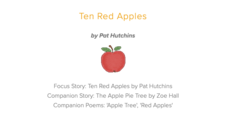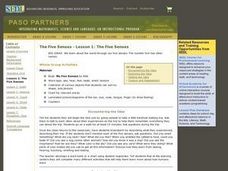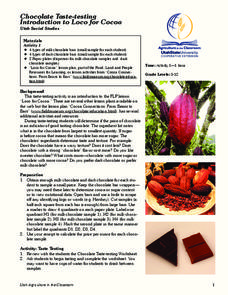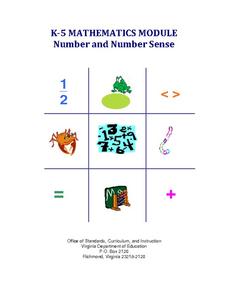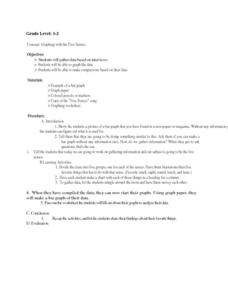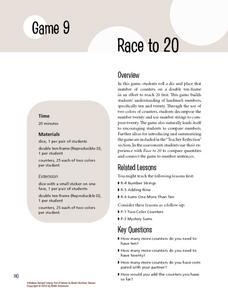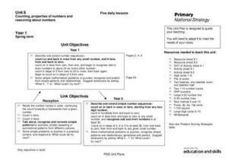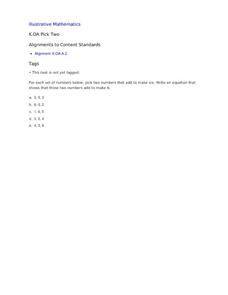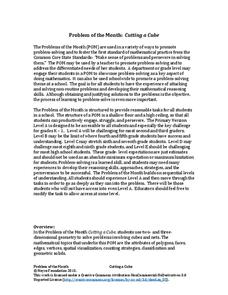Curated OER
Ten Red Apples; The Five Senses
A clever lesson designed around an apple awaits your learners. Descriptive words are used to explain what they believe is inside a bag while using their five senses. Students read the story The Apple Pie Tree and are introduced to the...
Curated OER
The Human Body
Explore the human body through hands-on activities. Young learners will trace their bodies and place cut out body organs in the proper place, print patterns using cut fruit, sing songs about good nutrition, and use their five senses...
Curated OER
The Five Senses - Barefoot Walking Trip
Students go outside and take a little barefoot walking trip. They talk to each other about their experiences on the trip to help them remember everything they can. They go on a walk for at least 15 minutes. Ask questions during the trip.
Curated OER
Six of One, Half Dozen of the Other
Students explore the garden with all five senses. In this Science lesson plan, students collect specimens from the garden to classify. Students use adjectives to describe the objects collected.
EngageNY
More Practice with Box Plots
Don't just think outside of the box — read outside of it! The 15th lesson in a 22-part unit provides pupils more work with box plots. Learners read the box plots to estimate the five-number summary and interpret it within the context....
Curated OER
What is It? Susie Sees!
Students explore the five senses. In this cross curriculum five senses instructional activity, students view an "I Can See Colors" PowerPoint presentation and sort items by color and shape. Students mix primary color paints to...
Curated OER
Chocolate Taste-Testing: Introduction to Loco for Cocoa
Students compare chocolates using their five senses and determine the value of the chocolate. In this chocolate lesson, students sample various types of chocolate. Students study the price per ounce of each bar to complete the...
Curated OER
K-5 Mathematics Module: Number and Number Sense
Reinforce number sense with a collection of math lessons for kindergarteners through fifth graders. Young mathematicians take part in hands-on activities, learning games, and complete skills-based worksheets to enhance proficiency...
EngageNY
Grade 5 Math Module 1, Topic C, Lesson 8
Go another round on rounding. Pupils refine their learned rounding skills in the eighth installment in an 18-part unit on decimals. The instructional activity takes away some of the previous scaffolding to encourage scholars to use the...
Public Schools of North Carolina
Math Stars: A Problem-Solving Newsletter Grade 2
Develop the problem solving skills of your young learners with this collection of math newsletters. Covering a variety of topics ranging from simple arithmetic and number sense to symmetry and graphing, these...
Curated OER
Graphing with the Five Senses
Students collect data and record it on a bar graph. In this data graphing instructional activity, each small group of students is assigned to collect data on one of the five senses. They then practice a song that helps them remember the...
Rational Number Project
Initial Fraction Ideas: Lesson 3
Visual models support young mathematicians as they deepen their fractional number sense in this elementary math lesson plan. Using fraction circle manipulatives, children explore basic unit fractions as they develop the...
National Security Agency
Are You Game? A Lesson Connecting Fractions and Probability
Exactly how fair are the board games children grow up playing? Young mathematicians investigate this questions as they work their way through this five-lesson series on basic probability.
Differentiation Central
Perimeter and Area
Leave no student behind with this differentiated geometry unit on perimeter and area. Over the course of five lessons, young mathematicians explore these foundational concepts through a series of self-selected hands-on activities and...
Math Solutions
Race to 20
And they're off! Working in pairs, young mathematicians roll dice to see who can fill in their double ten-frames first. When students finally fill in their arrays, they create addition number sentences that represent their rolls, helping...
Illustrative Mathematics
Which Number is Greater? Which Number is Less? How do you Know?
When comparing groups of objects, it's easy for children to identify which has more, but it's not so easy for them to explain their reasoning. This simple whole-group activity provides multiple opportunities for learners to compare...
Curriculum Corner
“I Can” Common Core! 3rd Grade Math
Help third graders make sense of the Common Core math standards with this simple checklist. By rewording each standard as an I can statement, children are provided with clear goals to focus on as they participate in math lessons.
EngageNY
The Division Algorithm—Converting Decimal Division into Whole Number Division Using Mental Math
Make math much simpler with mental math methods. The 16th installment in a series of 21 looks at ways scholars can apply mental math to convert division problems into easier problems with the same quotient. Multiplying or dividing both...
Curated OER
Counting, Properties of Numbers, and Reasoning about Numbers
Five days of lessons develop number sense and counting patterns, including odd and even numbers, 5s and 10s, doubles, and ways to make 10. Each session opens with fun finger play to reinforce counting and reasoning about numbers. Various...
Curated OER
Applied Science - Science and Math Lab
Students explore the senses. In this Applied Science lesson, students investigate the items in "feely" boxes with their hands, both touching the items and shaking the boxes to hear the sound the items make. Students also smell and taste...
Illustrative Mathematics
Pick Two
Learning to break apart numbers into smaller pairs is a critical step young mathematicians take as they develop their number sense. To practice this skill, children are provided with sets of three numbers and are asked to pick the two...
Scholastic
Adding and Subtracting Ten
Developing fluency with basic addition and subtraction is fundamental to the success of all young mathematicians. This four-day lesson series begins with learners using ten-frames and hundreds charts to recognize patterns when adding and...
Noyce Foundation
Cutting a Cube
Teach the ins and outs of the cube! A series of five K–12 level activities explore the make-up of the cube. The beginning lessons focus on the vocabulary related to the cube. Later lessons explore the possible nets that describe a cube....
Noyce Foundation
Cut It Out
Explore the mathematics of the paper snowflake! During the five lessons progressing in complexity from K through 12, pupils use spatial geometry to make predictions. Scholars consider a folded piece of paper with shapes cut out....
